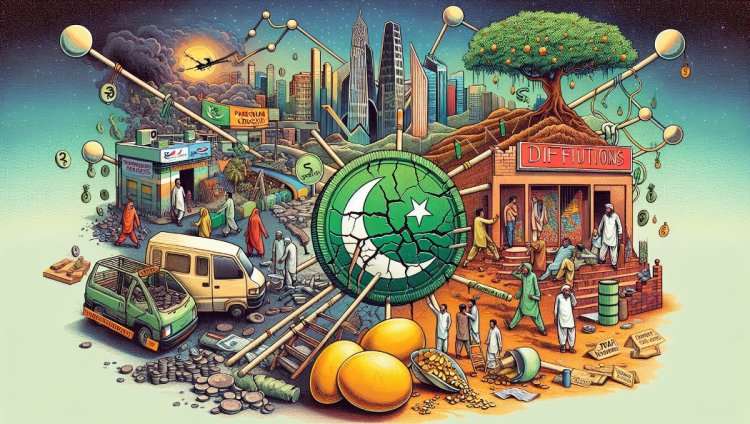Pakistan's Economic Crisis: Challenges and Solutions
Unraveling Pakistan's economic crisis: Explore the debt burden, inflation, and external pressures. Discover potential solutions like fiscal reforms, diversification, and regional cooperation.

Introduction
Pakistan is having a big problem with money right now. They owe a lot of money, don't have much money from other countries, and prices are going up a lot. The Pakistani currency, called the rupee, has dropped significantly, and the country urgently needs to improve its economy. The Prime Minister (the military) is now leading the country to overcome this crisis. But it will be difficult to recover. The government is talking to the International Monetary Fund (IMF) about getting help, but this means they will have to make difficult changes that will affect the poor. Pakistan needs to fix important problems, like corruption and bad tax policies, to have a stable economy for a long time.
Effects of Inflation and Rising Prices
Inflation and higher prices have greatly affected communities in Pakistan that are at risk. Inflation has gone up to 13.4 percent, which is the highest it has been in two years. Food prices have also increased by 17.3 percent. Because of this, poor people can't buy as much as they used to and have to spend less on important things they need.
Moreover, the rise in fuel prices has also impacted transportation expenses, making it harder for individuals to afford their daily travels. Communities are facing more problems during a heatwave because there is not enough power. This is making people uncomfortable and could be bad for their health.
The economic crisis has had negative effects on the agricultural sector, particularly in mango production. Pakistan is the fifth-biggest mango producer globally. However, it is predicted that there will be a 50 percent decrease in mango production because of hot weather and a lack of water. This will not only affect how much money mango farmers make but also how easy it is for people to find and buy mangoes.
Political Crisis and Imran Khan's Ouster
Imran Khan was removed as the Prime Minister of Pakistan on April 10th, which caused a time of political instability and uncertainty. During the vote of no confidence, Khan suggested a conspiracy theory, saying that there was a global plot to remove his government. Pakistan has a history of governments being disrupted, so this political crisis is not something new or unique to the country. In the past, governments have been disturbed because of different reasons, like coups and martial law. But, even with all the problems in politics, Shabaz Sharif has been chosen as the new Prime Minister. His job is to guide the country out of its economic troubles.
Imran Khan's ideas that go against the mainstream have made the political situation in Pakistan even more uncertain. After he was removed from power, he organized many gatherings to ask for new elections. He keeps talking about a worldwide plot and using words that divide people. This is causing our society to break apart and making it harder for us to make progress in our economy.
Pakistan has a history of governments being interrupted, and no civil government has finished its time in office. The absence of stability has made it difficult to implement long-term economic plans and achieve development. But now that Shabaz Sharif has become the new Prime Minister, there is hope that things will become stable and that the country will focus on fixing the big problems it has been facing.
The PM has a difficult job of guiding the country through the economic crisis. The government is talking to the International Monetary Fund (IMF) about getting help, and they might have to make some difficult changes to how they spend money. Choosing Sharif shows that they are committed to fixing the economic problems and making changes to bring stability in the long run.
Economic Crisis and IMF Bailout
Pakistan is going through a big economic problem right now. It has a lot of debt and not much money from other countries, and prices are going up a lot. The country really needs to improve its economy, and Prime Minister Shabaz Sharif is taking charge to tackle these problems. Pakistan is talking to the International Monetary Fund (IMF) to get help with their economy. They want to become more stable financially.
Looking at Pakistan's debt and financing gap gives us an idea of how big the crisis is. The country will have $6.4 billion of debt in the next three years. The IMF loan would assist Pakistan in handling its balance of payments issues, stabilizing the economy, and managing foreign currency reserves.
The government has made changes to the budget to meet the requirements of the IMF bailout. These changes include getting rid of subsidies for fuel and energy, as well as raising taxes. The austerity measures are important to fix Pakistan's economic problems and manage its finances better.
However, it can be challenging to put spending cuts into action. The government of Pakistan needs to deal with political challenges and get the support of the public for these actions, especially because there will be elections next year. The government needs to be stable and committed to making the necessary changes for the implementation to be successful.
The IMF program is important for making other lenders feel stable and confident. The revival of the program will not just solve the money problem but also show that Pakistan is committed to fixing its economic issues. The changes and spending cuts might affect the poor, but they are important actions to make Pakistan's economy stable in the long run.
Impact on the Poor and Vulnerable
The economic crisis in Pakistan has had significant repercussions for the impoverished and vulnerable populations in the nation. Muhammad and Etysham, who are small vendors and sellers, have been facing difficulties in meeting their financial needs as a result of inflation and the increasing costs of fuel. As inflation has risen to its highest level in two years and food prices have surged, the purchasing power of the less fortunate has been diminished. This has compelled them to reduce their consumption of necessary goods.
Furthermore, the lack of fuel, electricity, nourishment, and medication has worsened the challenges experienced by these communities. The heatwave has caused power shortages, which have resulted in discomfort and possible health risks. Additionally, there have been water shortages that have hurt agricultural production, specifically affecting mangoes. This situation has affected both farmers and consumers.
The decline in the value of the Pakistani rupee compared to the US dollar has further exacerbated the economic conditions for the less fortunate. Due to the rupee's unfortunate performance as the weakest currency in Asia, the prices of imported goods have risen, resulting in an increase in the cost of essential commodities.
Moreover, the consequences of heightened taxes and price increases have further burdened the less fortunate. The government has taken steps to address the terms of the IMF bailout by implementing budget measures. These measures include removing subsidies for fuel and energy, as well as increasing taxes. The implementation of these austerity measures, although essential for financial stability, has had a greater impact on individuals who are less fortunate and more susceptible to hardship.
Structural Issues and Tax Reforms
Pakistan has faced significant challenges throughout its history, particularly in the areas of policy and currency management. These issues have been deeply ingrained and have posed ongoing difficulties for the country. Poorly managed tax policies and an unfavorable environment for investment have made the current economic crisis worse. To attain enduring economic stability, Pakistan must tackle these underlying concerns.
One of the main challenges we face is the issue of fiscal deficits and the repayment of debt. Pakistan is currently grappling with a debt burden of $6.4 billion that it must address within the next three years. This is exerting considerable pressure on the country's economy. To tackle these fiscal challenges, it is imperative to implement stringent austerity measures, such as eliminating fuel and energy subsidies and raising taxes.
The tax policy of the country is flawed, as it heavily relies on taxing commodities instead of implementing a well-structured tax policy based on clear policies and methods. We must prioritize the implementation of essential tax reform to establish a tax system that is both efficient and equitable.
Enhancing tax administration poses yet another challenge. The tax system in Pakistan is antiquated, inefficient, and has proven ineffective in collecting taxes. Significant changes in tax administration are required to enhance tax compliance and increase revenue generation.
Social Safety Net and Assistance Programmes
Pakistan has a social security program in place to provide support for the poorest and most vulnerable populations. This program utilizes cash transfers, targeted subsidies, and increased health and nutritional coverage to assist roughly 3-5% of the population, or around 6–11 million people.
Overview of Pakistan's Social Security Programme
The program aims to alleviate poverty and provide a safety net for those in need. Cash transfers are provided to eligible individuals and families, helping them meet their basic needs and improve their overall well-being. Targeted subsidies are also offered to reduce the burden on essential commodities such as food and fuel.
Challenges in Providing Support for the Poor
While the social security program is designed to assist the most vulnerable, there are challenges in effectively reaching and supporting all those in need. Limited resources and a large population make it difficult to provide comprehensive assistance to everyone who requires it.
Calls for holistic packages to help the vulnerable
There have been calls for the government to develop holistic packages that address the specific needs of the vulnerable population. This includes removing school fees, providing free medicines, and expanding cash transfer programs. By providing a comprehensive and tailored approach, the government can better support those who are most in need.
Impact of Cash Transfer Cuts on Families
Recent cash transfer cuts have had a significant impact on families, particularly those living in poverty. These cuts have reduced the income and purchasing power of families, making it even more challenging to meet their basic needs. As a result, families are forced to make difficult decisions, such as cutting back on essential commodities and limiting access to healthcare and education.
Impact on Businesses and Industries
The economic crisis in Pakistan has greatly affected businesses and industries throughout the nation. Muhammad and Etysham, just like other small business owners and entrepreneurs, have been facing difficulties in meeting their financial obligations. This is primarily due to the impact of inflation and the continuous increase in fuel prices. Rising prices have diminished the purchasing power of the less fortunate, compelling them to reduce their spending on necessary goods. This has directly affected small vendors and sellers who depend on their customers' buying power.
The crisis has also posed challenges for the marble and steel industries. The marble industry has been facing challenges such as outdated quarrying and processing techniques, rising transportation expenses, and expensive electricity rates. In a similar vein, challenges in development and the surge in steel prices have had a significant impact on the steel industry.
The government's budget and fiscal targets play a crucial role in addressing these challenges. The government is currently in talks with the International Monetary Fund (IMF) to secure a financial assistance package, which is likely to come with strict measures to reduce spending. Although these measures are essential for achieving fiscal consolidation, they could potentially have additional consequences for businesses and industries.
The implementation of austerity measures, such as the elimination of fuel and energy subsidies and higher taxes, could potentially create added pressure on businesses. Implementing reductions in expenditure can pose a challenge, particularly in light of the upcoming elections next year. The government's ability to maintain political stability and dedication to essential reforms are vital for the successful execution of plans.
The Role of the IMF and Anti-Corruption Measures
The loan provided by the International Monetary Fund (IMF) plays a crucial role in stabilizing the economy of Pakistan. The loan assists in addressing the country's balance of payments issues, stabilizing the economy, and preserving foreign currency reserves. The IMF loan is crucial for Pakistan to tackle its increasing debt crisis and guarantee economic recovery.
To fulfil the conditions of the IMF bailout, the government has taken steps to reduce spending by eliminating subsidies for fuel and energy, as well as raising taxes. These actions are essential to achieving fiscal stability and tackling the underlying problems that have contributed to the economic downturn. Nevertheless, these measures might hurt the less fortunate individuals, and the government must skillfully maneuver through political challenges while also garnering public approval for their execution.
Efforts to address corruption are equally important for ensuring long-term economic stability. Pakistan has faced a prolonged battle against corruption throughout its history. The government must create a dedicated team to combat corruption and assess the effectiveness of laws designed to prevent dishonest practices within government entities. Addressing corruption will create a more transparent and accountable system, attract foreign investment, and foster an investment-friendly environment.
Implementing policies that are favorable to investment is another crucial factor in attaining economic stability. Pakistan should prioritize the establishment of a conducive atmosphere that promotes investment. Implementing the necessary reforms to improve tax laws, tax administration, and currency management will help achieve this. Implementing these strategic modifications will enhance the appeal to international investors and foster long-term economic expansion.
Political Stability and Future Outlook
Pakistan is presently grappling with a significant economic predicament. To tackle this challenge, it is crucial to emphasize the importance of political maturity and resolving conflicts. Political leaders must prioritize government stability and concentrate on peacefully resolving conflicts. While early elections are indeed a democratic procedure, they might not be the most optimal solution presently. Instead, we should prioritize the stabilization of the economy and ensure the completion of the government's term.
Political instability can lead to severe consequences for a nation, especially during an economic crisis. It causes doubt and obstructs the advancement towards achieving lasting economic stability. Pakistan must prioritize stability and steer clear of any additional disruptions that could hinder essential reforms and impede economic recovery.
While it is crucial to maintain political stability, it is equally vital for the government to tackle the underlying structural problems that have long troubled the nation, such as corruption and ineffective tax policies. To attain lasting economic stability and foster an environment conducive to investment, these concerns must be addressed.
Ensuring political stability is crucial amidst the ongoing economic crisis in Pakistan. It is important to emphasize the need for political maturity, resolving conflicts, and prioritizing the stabilization of the economy for the country to successfully overcome its challenges and attain lasting stability.
Conclusion
In summary, Pakistan is facing an economic crisis due to a mounting debt crisis, declining foreign exchange reserves, and rapidly increasing inflation. The nation is currently encountering noteworthy difficulties that necessitate stability, reforms, and the resolution of profound structural problems.
To attain enduring economic stability, it is of utmost importance for Pakistan to enact essential reforms and tackle concerns such as corruption and ineffective tax policies. These structural issues have impeded the nation's development and progress.
The government's discussions with the International Monetary Fund (IMF) for a financial assistance plan are a positive move towards improving the economy. Nevertheless, the implementation of stringent cost-cutting measures will be necessary, potentially affecting those who are less fortunate. It is essential to find a balance between the necessity of fiscal consolidation and the welfare of vulnerable populations.
Despite the difficulties, there is optimism for a more promising future and recuperation. The selection of Prime Minister Shabaz Sharif demonstrates a dedication to tackling the economic crisis and carrying out essential reforms. Stability and economic growth require the agreement of political leaders and a commitment to long-term solutions.
FAQ
Here are some frequently asked questions about the current economic crisis in Pakistan:
What is the current economic crisis in Pakistan?
Pakistan is currently facing a severe economic crisis characterized by a growing debt crisis, dwindling foreign exchange reserves, and soaring inflation. The Pakistani rupee has plummeted, and the country is in desperate need of economic recovery.
Why is the IMF bailout important for the country?
The IMF bailout is important for Pakistan as it helps manage the country's balance of payments problems, stabilize the economy, and maintain foreign exchange reserves. The loan would also help Pakistan address its growing debt crisis and ensure economic recovery.
What impact does inflation have on the poor?
Inflation has a significant impact on vulnerable communities in Pakistan, particularly the poor. With inflation reaching a two-year high and food prices surging, the buying capacity of the poor has been eroded, forcing them to cut back on essential commodities.
What are the challenges in implementing spending cuts?
Implementing spending cuts in Pakistan faces challenges such as political obstacles and gaining public support. With elections coming up next year, the government needs to balance the need for fiscal consolidation with the well-being of the population.
Why is political stability crucial for Pakistan's economy?
Political stability is crucial for Pakistan's economy, as it creates certainty and allows for necessary reforms to be implemented. Stability also attracts foreign investment and fosters an investment-friendly environment, which is essential for long-term economic growth.



 admin
admin 










